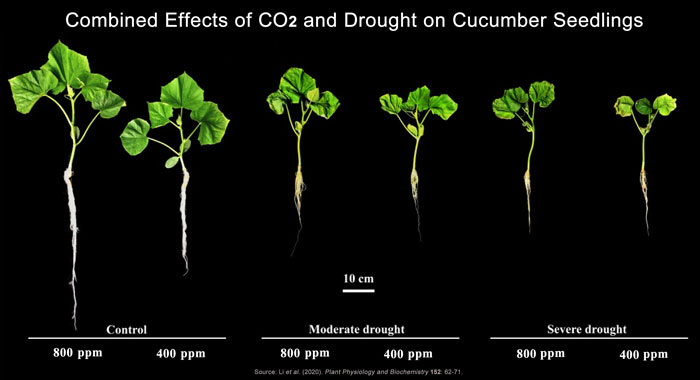Combined Effects of CO2 and Water Stress on Cucumber Seedlings
Li, Y., Li, S., He, X., Jiang, W., Zhang, D. and Liu, B. 2020. CO2 enrichment enhanced drought resistance by regulating growth, hydraulic conductivity and phytohormone contents in the root of cucumber seedlings. Plant Physiology and Biochemistry 152: 62-71.
Writing as background for their study, Li et al. (2020) say that “little information is available on the coupling effects of CO2 enrichment and drought stresses on water uptake and transport in cucumber seedling roots, and also the interaction between phytohormone contents and aquaporin expression of root are unknown.” Thus, they designed an experiment to “analyze responses of cucumber seedling roots to CO2 enrichment, so as to provide deep explanations for the favorable effects of CO2 enrichment on drought stress.”
The experiment was conducted in a controlled environment where cucumber (Cucumis sativus, cv. Jinyou No. 35) seedlings were exposed to ambient (400 ppm) or elevated (800 ppm) CO2 concentrations and subjected to one of three watering regimes (control, moderate drought or severe drought) once the second true leaf was fully unfolded. Root growth and morphological parameters were assessed shortly thereafter, along with hydraulic conductivity and phytohormone content measurements.
In discussing their findings Li et al. write “CO2 enrichment played a role in alleviating drought stress [and] increased the root biomass” (see Figure 1 below). Elevated CO2 also significantly enhanced the total root length, total root surface area and total root volume of the seedlings by 18%, 38% and 49%, respectively.
The authors also report higher CO2 levels increased the hydraulic conductivity of the root system under control conditions and helped to alleviate an observed decrease of hydraulic conductivity under moderate drought, however there was no significant CO2 effect on this parameter under severe drought. Consequently, Li et al. say these results reveal “CO2 enrichment can reduce the negative effect caused by drought stress on cucumber roots to a certain extent, but the mitigatory effect is diminished with increasing severity of drought stress.”
Lastly, Li et al. found that phytohormones were differentially expressed under elevated CO2, resulting in an overall improvement of hydraulic conductivity and enhanced water absorption transport capability of the cucumber seedlings under water stress. In summation, therefore, the researchers conclude “CO2 enrichment improved drought tolerance and promoted the growth of cucumber seedling roots.”

Figure 1. Effect of atmospheric CO2 (400 or 800 ppm) on the morphology of cucumber roots under drought stress (control, moderate or severe). Source: adapted from Li et al. (2020).
This article appeared on the CO2 Science website at http://www.co2science.org/articles/V23/sep/a6.php
]]>